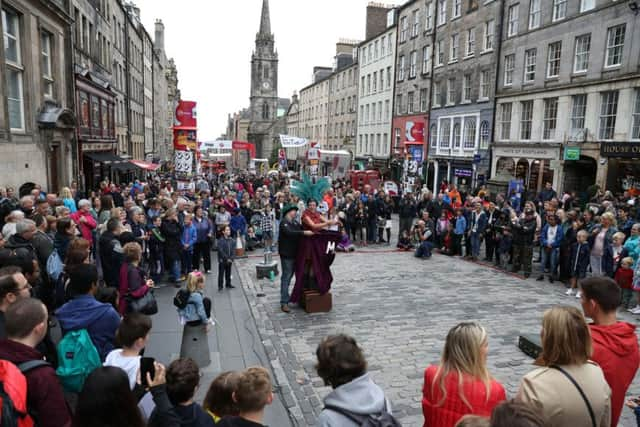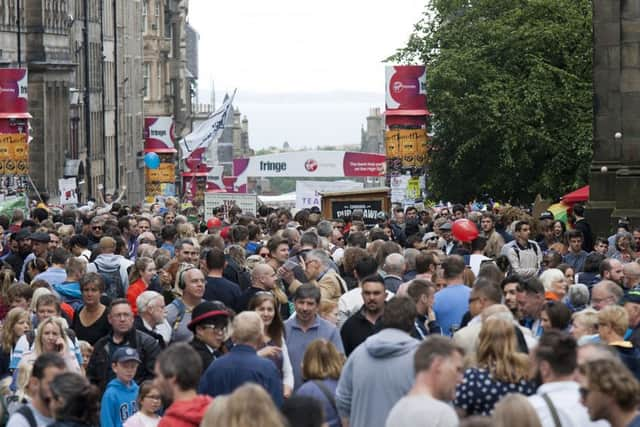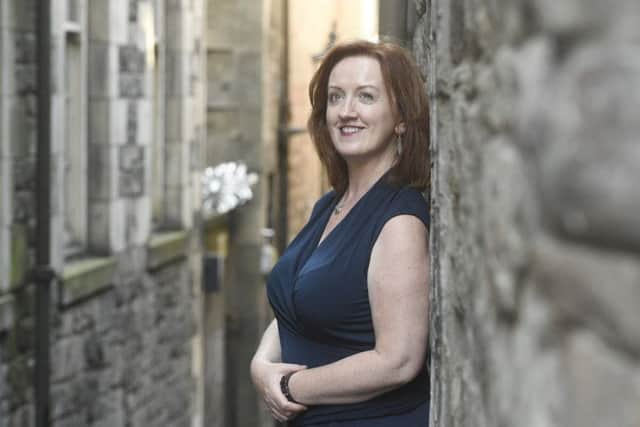Edinburgh Fringe chief: Accommodation prices will '˜kill life-force of festivals'


But anyone arriving in the city for the first time could be forgiven for thinking the world’s biggest arts festival is in full cry such is the throng of tourists and street entertainers outside its headquarters.
Inside, last-minute preparations are being made by the Fringe Society for its 20th year of managing the High Street arena, which will be getting a makeover to coincide with the anniversary.
Advertisement
Hide Ad

A year on from the Fringe’s own 70th birthday celebrations, all the indications are that the event is going from strength to strength, with more shows than ever before set to be staged across a record 317 venues.
But inside her modest office above the festival’s bustling box office, the Fringe Society chief executive Shona McCarthy is warning that complacency over the event’s success is actually the biggest threat to its future.
With nearly 2.7 million Fringe tickets shifted last year, it is no surprise that it is responsible for the vast majority of the £313 million in economic impact now estimated to be generated by Edinburgh’s festivals.


But the Fringe’s success has had a sting in the tail for the Fringe Society and the hundreds of companies it works with every year.
The soaring cost of accommodation has been identified as the major barrier to participation in the event in future on the back of last year’s Fringe – it is regarded as a more serious threat than the looming prospect of Brexit.
The concerns raised by artists, performers, producers and promoters are being treated so seriously by McCarthy they have prompted her to warn that the very “life-force” of Edinburgh in August could be killed off by the dramatic cost of staying in the city.
Advertisement
Hide AdRather than bring down the cost of accommodation, the opening of new budget hotels across the city centre and the Airbnb boom for the private accommodation sector seem to have simply sent prices soaring even further.


McCarthy has thrown down the gauntlet by asking for a “city-wide effort and commitment” to help curb the cost of staying in Edinburgh in August.
Advertisement
Hide AdShe also wants a collective effort to be made to ensure Edinburgh is treated as a year-round capital of culture by all the main agencies in the city and for the arts to be given similar billing to the heritage of the Scottish capital.
Appointed two and a half years ago, McCarthy had been responsible for Derry-Londonderry’s year as the first ever UK City of Culture and led Belfast’s bid to become a European Capital of Culture.
As she prepares to take the helm of the event for the third time, she admits to some frustration that the make-up of the Fringe is “misunderstood”.
“I don’t think people realise that the Fringe Society is a charitable organisation that only has 24 people working for it or that the Fringe is full of completely different business models,” she said.
“There are big venues with big commercial acts in them, but there are also hundreds of free and pay-what-you-want shows, and free street events. It’s such an eclectic mix of every possible business model. It is a phenomenon.
“I think people just make assumptions about what it is and how it operates. We need to do more to clearly and transparently articulate how this festival works. It’s not a curated and programmed publicly funded festival. It’s a range of people taking real risks to bring work here.”
Advertisement
Hide AdAlthough there is widespread accommodation still available at many of the city’s top hotels this weekend, the prices are hovering near the £500 mark for a one-night stay. Budget chains are asking more than £200 for a room on Princes Street or the Royal Mile.
Bringing down the cost of accommodation in Edinburgh in August has been identified as one of the biggest priorities for the Fringe in a new five-year plan.
Advertisement
Hide AdMcCarthy, who told tourism industry leaders earlier this year that the city had to take more care to provide a “supportive landscape” for the Fringe, admits the issue is not a new one.
But she insists there has never been a collective push to tackle the soaring cost of accommodation to ensure the event remains “affordable and accessible to all”. She said: “At the heart of the Fringe are the artists and creative people who come and make work here.
“They are the driving force for all of the other economic impacts across the city in August.
“The moment at which it becomes too expensive for artists to spend the entire month here, or do even part of a run in Edinburgh, will kill off the very thing that drives it all in the first place.
“A city that is so proud of its festivals because of their positive global reputation, their economic impact, cultural impact and social impact has to be really careful to preserve them.
“The cost of accommodation has the potential to be the defining barrier to participating in the Fringe unless everyone is acutely aware of it.
Advertisement
Hide Ad“I’m aware some people think: ‘Well, there’s nothing you can do, it’s down to market forces and what can the Fringe Society do about that?’
“I think that’s just complacency. If we don’t take a leadership role around it who will?”
Advertisement
Hide AdThe launch of the 2018 Fringe programme last month was accompanied by the unveiling of a five-year blueprint for the future of the event.
Key aims include the expansion of a scheme launched last year to ensure free tickets for shows are distributed to local charities, to guarantee that artists have permit-free status to perform at the event in the wake of Brexit and to find a new year-round home for the event in the heart of the city centre.
The vision has emerged from months of talks with Fringe participants, who left McCarthy and her team in no doubt about the priority issue to be tackled over the next few years.
“The cost of accommodation was by far the thing that was raised the most in the conversations we had,” she said. “We now need to have a concerted effort to address it.
“We know we have a responsibility ourselves. That’s why we’ve frozen our registration fees for a 12th year and have made a commitment that they will be frozen for the next five years and ideally will never increase again – and if anything will actually decrease.
“We’ve also committed to reducing the commission we take on ticket sales from 4 per cent to 3 per cent.
Advertisement
Hide Ad“The Fringe Society cannot do it all on its own. We are the ones saying: ‘This is going to be a problem. You’re going to kill the life-force of these festivals if you don’t do something about it.’
“It’s very straightforward. If you’re an artist and you can’t find accommodation in a place offering you a platform to perform for up to a month, it doesn’t matter how much you want to do it. If you can’t afford it you can’t afford it.
Advertisement
Hide Ad“You can’t just keep putting the prices up. It will eventually become an issue, it really will.
“Some people in the industry have been prepared to work with us and come at things from a more ethical position, but we’ve only just put this out there.
“But how disingenuous would it have been for us to open up a conversation about issues, barriers, concerns and threats and when they come back and say they are concerned about the rising cost of accommodation to then just ignore it and say nothing about it?”
William Burdett-Coutts, founder of Assembly Festival, said: “We are already experiencing problems bringing shows to Edinburgh because of the costs involved.
“There are countless shows that we have talked to that just can’t afford to come here.
“With bigger shows and high-quality work we have to help underwrite their costs to ensure they don’t walk away with a big loss. It wouldn’t be in Edinburgh otherwise.
Advertisement
Hide Ad“If you look at the festival circuit and what people can do elsewhere in the world, the costs in Edinburgh are a thing of legend. It’s already a real barrier. I was talking to someone the other night whose accommodation costs in Edinburgh are higher than their air fare from Australia.
“The costs for everybody are huge in Edinburgh, but it’s not a commercial environment. You don’t come to Edinburgh to make money unless you’re a big-name comedian. But we can’t just have the same acts coming back every year. To encourage new work to come here it has to be viable for people.”
Advertisement
Hide AdKaren Koren, founder of Gilded Balloon, said: “While it’s not the only challenge we face during the Festival, accommodation costs are an issue. People raising prices and the exploitation of Fringe artists is not something we agree with, and we would welcome a plan to tackle this over the coming years.”
A spokesman for the City of Edinburgh council said: “The council is committed to working with the festivals, accommodation and venue providers, and all other stakeholders to address the issue of affordability in the face of a strong property market and continued pressure on the public purse.”
Last year’s Fringe played out against a backdrop of controversy over claims Edinburgh was the latest city to suffer from over-tourism.
Heritage groups have called for action to be taken to explore the impact of the tourism industry on the city during the peak festival periods in summer and winter.
An official report published by the city council in January warned that Edinburgh was struggling to cope with “bottlenecks” of crowds in the Old and New Towns, a lack of space for pedestrians, pressure on the roads and public transport networks, and an inability for many people to “get on with normal life”.
McCarthy said: “To me, the festivals and heritage are interconnected. They shouldn’t be in contention, they should be absolutely hand-in-hand and working together.
Advertisement
Hide Ad“One is about the back-story of Edinburgh and the other is about a contemporary representation of where Scotland sits in the world.
“But the Fringe has been running for 70 years and is part of the heritage of the city now. It’s as much a part of the reputation of the city as the castle.
Advertisement
Hide Ad“I’d like to see far greater collaborative efforts across all the agencies in the city to make all things work for the benefit of everyone.
“We should see Edinburgh as a year-round capital of culture to ensure everything works properly and have a year-round planning process, not just three months before the festivals kick in.”
McCarthy dismisses reports that public anger about the impact of Edinburgh’s festivals is growing.
“You have to weigh things up. Edinburgh is a busy city year-round now. I can walk around it in June and September and it feels just as busy as it does in August.
“Other people come here all through the year and want to understand the model and how they can make it happen in their place. To me, the Fringe should be more treasured and valued than complained about it.
“I’d like more opportunities for everybody in the city to work together and say: ‘What really are the problems here?’
Advertisement
Hide Ad“The reason that the festivals in Edinburgh work and make it a festival city over and beyond any other city in the world is the backdrop. It’s the landscape, the castle, the walkability, the beauty, the heritage and the back-story.
“I genuinely think the Fringe is more accessible to audiences than ever. It’s all about communication and messaging. Sometimes the myths and legends about the event don’t help. But the reality is you can do the Fringe on no budget and see an incredible mix of work.
“Two years ago my two daughters came here with a budget of £50 each. They managed to go out and see four or five shows each day. They knew every single move.”
